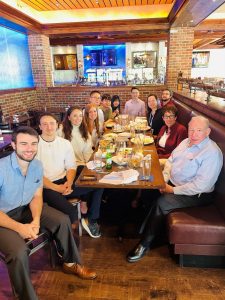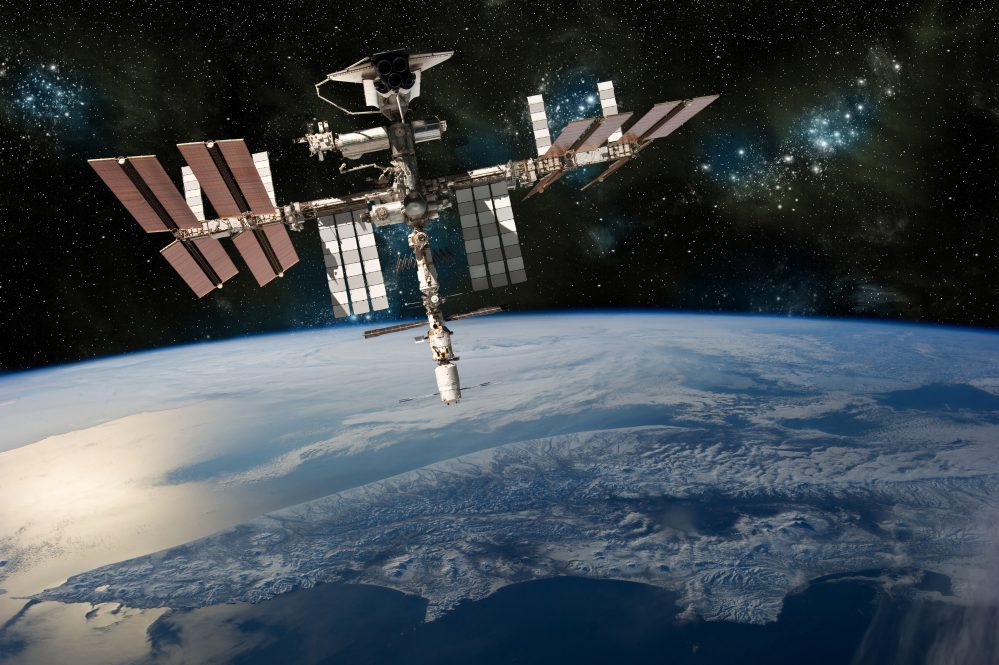A UConn Biomedical Engineering professor engaged in pioneering tissue research has won a NASA contract to fabricate therapeutic biomaterials under low gravity conditions aboard the International Space Station (ISS).
Associate Professor Yupeng Chen and his team of six graduate and eight undergraduate students will work with astronauts aboard the ISS doing experiments aimed at advancing in-space manufacturing concepts for the production of potentially marketable biomaterials for use in therapeutic and regenerative treatments here on earth for arthritis, cancer, and neurological diseases. The $1.86 million contract is one of eight winning proposals submitted in response to a NASA Research Announcement seeking space production applications for three low-Earth orbit (LEO) missions scheduled over 27 months.
Chen, who is PI of the project, will work with two partners – UConn spinoff, Eascra Biotech of Boston, and Axiom Space, a private aerospace company based in Houston, Texas – to conduct a proof-of-concept study aboard the ISS involving the fabrication of Janus base nanomaterials (JBN), a family of novel biomaterials that mimic DNA. The collaboration combines Axiom’s experience in spaceflight operations and space infrastructure development with Eascra’s expertise in the development of advanced biomaterials and project management, including venture capital fundraising and implementation of future product commercialization initiatives associated with the project. Two of the flights will be funded by NASA and one flight will be supported by Axiom’s private astronaut mission in spring 2023.

“This project will establish a roadmap to commercialize the in-space manufacturing strategy for a family of DNA-inspired Janus base nanomaterials used for tissue regeneration,” says Chen. “Leveraging the benefits of microgravity in the fabrication process has the potential to deliver more orderly JBN structures to achieve better structural integrity and therapeutic outcomes.”
Nanomaterials are ultrafine particles of matter characterized by their tiny size, usually between 1 and 100 nanometers (nm) in diameter. A nanometer is roughly one millionth of a millimeter, approximately 100,000 times smaller than the diameter of a human hair. Materials engineered to such small scale can take on unique optical, magnetic, electrical and other properties with tremendous potential impact in the fields of electronics, medicine and beyond.
For the ISS mission, Chen and his team will focus on their two most promising JBN applications – a Janus base nanopiece (JBNp™), a delivery vehicle for mRNA and gene editing that can be used to treat diseases or produce a vaccine with oncological and neurological applications; and a Janus base nano-matrix (JBNm™), a porous, injectable material or scaffold onto which cells can adhere and grow. In this case, the scaffold would be used to promote cell growth for tissue repair and the regeneration of cartilage.
Chen and his team will work closely with ISS astronauts in real time to guide them through the experiments. The samples produced in space will be used in animal tests back on Earth to compare therapeutic outcomes associated with JBNs developed in space with those produced on Earth, Chen says. Dr. Cato T. Laurencin, a distinguished professor of orthopaedic surgery at UConn School of Medicine and a biomolecular and regenerative engineering expert, will act as a consultant and PI on a subcontract of the project, using his medical expertise to advise Chen’s team on potential clinical applications for their technology.
Decades of low gravity research have laid the groundwork for U.S. industry to demonstrate the unique market value of in-space manufacturing, technology advancement, and drug development. To date, NASA has provided seed money in excess of $38 million for more than a dozen technologies to enable innovative companies to develop their concepts and stimulate demand for future markets.
The second and third phases of Chen’s project will focus on using a robotic arm in the fabrication process and possibly conducting bio-manufacturing processes aboard Axiom’s commercial space station.
“This is a unique project specifically designed to promote the commercial applications of low-Earth orbit in the field of biomedical technologies that advance medical science and provide novel therapeutic solutions currently unavailable on earth,” says Chen. “I do think we will soon have a product. We are getting closer to this goal, and are closer than any time before.”



